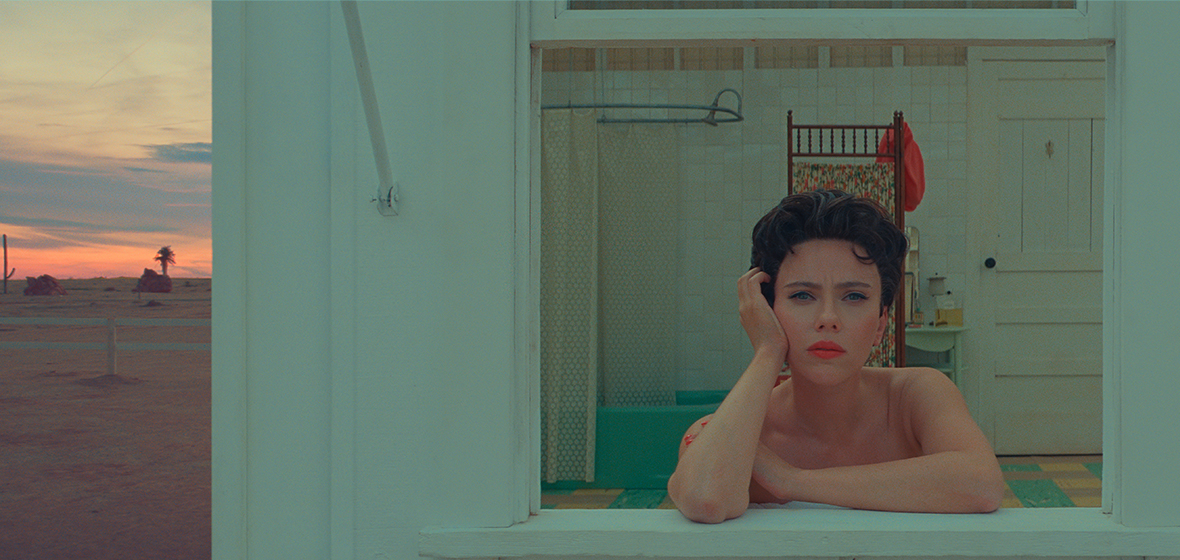Asteroid City
The last time Wes Anderson tried to appeal to the general audience was when he made The Grande Budapest Hotel. It had all the ingredients for a crowd-pleaser, which Anderson proudly indulged in. It felt like he was turning a page, which in a sense he was, but only because that critically and audience-acclaimed film was the last of its kind.
Since then, every new film he releases (and there have been three, Isle of Dogs, The French Dispatch, and now Asteroid City) is an almost experimental piece of narrative where Anderson explores what exactly are the boundaries of his style. So far, so good; boundaries haven’t been reached yet.
Visually, Asteroid City is the most Wes Anderson of all Wes Anderson films. Shot and framed with the precise exactness of colour-coded design, it also has gorgeous miniature sets, stop-motion animation, and a palette of colours so engaging, it couldn’t even be imagined by a Swedish furniture designer.
The film is beautiful, with washed bright colours against matte-painted backgrounds. Sometimes, Anderson dares to try something new, and it always works, like his dramatic Dutch-angle black-and-white shots and the split-diopter at the start (a technique where two people, on in front and one in the back, are both in focus), like Billy Wilder doing a noir. But for the most part, it’s the usual front facing-perfectly-framed-track-shot that Anderson has perfected since Bottle Rocket.
The narrative frame is a 1950s TV performance of a play called Asteroid City that includes a dramatisation of its production. Shot like a 1940s noir, somewhere between Carol Reed, Wilder, and Otto Preminger, the section is hosted by Bryan Cranston playing a riff on Rod Serling, with Edward Norton as the play writer Conrad Earp, and Adrien Brody as Schubert Green, the director so devoted to his craft it caused the end of his marriage.
The play, shot as a typical Anderson fantasy, follows a group of people who meet at the small desert town of Asteroid City for an award ceremony dedicated to young teen inventors. The town is known for an asteroid crater, which turned into a potential hotspot for stargazers and space nuts, or so hopes the local Motel Manager (Steve Carrell).
The story centres on Augie Steenbeck (Jason Schwartzman), a young photographer and recent widower, who is in town to attend the ceremony with his brainiac son Woodrow (Jake Ryan) and leave his three daughters with his father-in-law Stanley (Tom Hanks).
In town, Angie meets a collection of classic Andersonian oddballs, from a band of singing cowboys (including Rupert Friend, Seu Jorge and Jarvis Cocker) to the head of the local space observation centre, Dr Hickenlooper (Tilda Swinton). Yet it is the actress Midge Campbell (Scarlett Johansson) who catches his eye.
I struggled to connect with Asteroid City for most of the first act. The quirkiness was the usual charm I expect from Anderson, but there was a coldness to the performances that put me off. Everyone, especially the adults (particularly Augie), overthink everything they do in order to reach the most reasonable course of action.
It is utterly devoid of emotion, sterilised to the point that it hides its beating heart.
But at the end of the first act, Anderson slowly reveals this by design. At the end of a conversation, Midge asks Augie what is it he is feeling? “I don’t feel anything”, Augie responds, not a hint of sadness and regret in his voice.
That’s when it hits that Asteroid City is a film valiantly trying to prove its auteur still has the playful spark he had when he first started. I read a couple of reviews that claim this is a film about processing grief, which I think is wrong. With better results, Anderson has already done that in the unofficial trilogy The Royal Tenenbaums, Life Aquatic with Steve Zizzou, and The Darjeeling Limited.
No, Asteroid City is about our grown-up obsessions leading to loss – Augie’s and Green’s – and missing out on the wonder in front of us.
That is why Anderson takes every chance to play with the images, making the equivalent of a pop-up book in film form. Every once in a while, a gag reminds us there is more to life than our lives. My favourite is a recurring gag of cartoonish police chasing gangsters across town, disrupting the peacefulness.
As it goes on, it becomes more evident Anderson is not looking for answers but for vindication. Adults bore him, he seems to think, and are at their best when they indulge in children’s games.
A metaphor, an actor says, when asked about the meaning of the alien (oh yes, there is an alien). Because the only way we can admit something exists is if it holds a more significant meaning that draws us closer to a larger truth. But why this search for answers? What do we take from this but our smug sense of accomplishment? That passing metaphor comment is followed by a conversation between the actor playing Augie with Green, and if its conclusion is an easy way out for the story, it’s also a straightforward message that resonates beyond it. Asteroid City is mainly about the life we’re missing because of ourselves.
I like how Anderson stopped trying to please everyone. He makes the films he wants to, his fans know what to expect, and those who have not enjoyed his stuff are not about to be converted. Here, he gleefully indulges in a strange and off-beat end of the third act that I connected with pretty strongly. He earns it, and at least, we can reassure him he hasn’t lost his youthfulness.
Verdict: 4.5 out of 5
For Wes Anderson fans, especially those who understood that the annoying social media trend from a couple of months ago misunderstood and mischaracterised the filmmaker.




